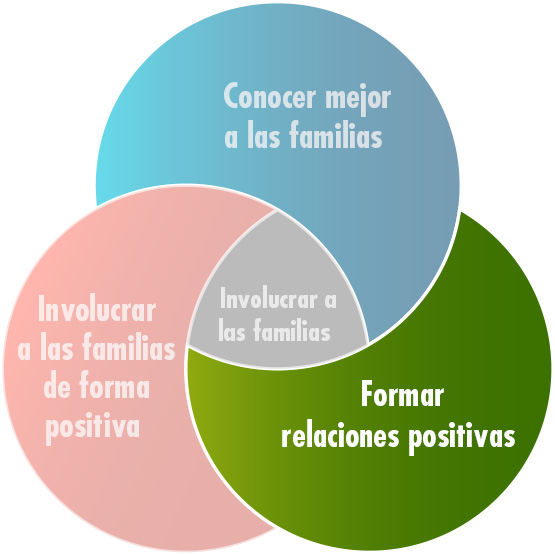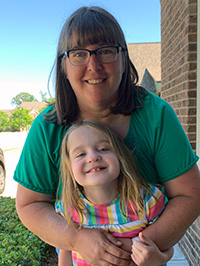¿Cómo pueden los maestros colaborar con estas familias?
Página 5: Formar relaciones positivas
 Recuerde que para involucrar a las familias de forma exitosa, los educadores tienen que conocer mejor a las familias, formar relaciones positivas con ellas e involucrarlos de manera significativa. Establecer relaciones positivas genera atmósferas conducentes a la participación familiar. Esto es vital para mejorar los resultados de los estudiantes, de las familias y la escuela al igual que en la comunidad en general. Veamos una variedad de acciones que los educadores pueden llevar a cabo para conseguir este fin.
Recuerde que para involucrar a las familias de forma exitosa, los educadores tienen que conocer mejor a las familias, formar relaciones positivas con ellas e involucrarlos de manera significativa. Establecer relaciones positivas genera atmósferas conducentes a la participación familiar. Esto es vital para mejorar los resultados de los estudiantes, de las familias y la escuela al igual que en la comunidad en general. Veamos una variedad de acciones que los educadores pueden llevar a cabo para conseguir este fin.
Crear un ambiente de aceptación y apoyo es el primer paso para darle la bienvenida a las familias. Cuando las familias entran a un edificio escolar, deben sentires valoradas e incluidas. Esto es particularmente cierto para las familias de niños con discapacidades que ya podrían estar lidiando con una serie de factores estresantes. Ahora bien, un ambiente escolar acogedor es más que una recepción con personal amistoso. Las interacciones de todas las personas en la escuela—administradores, maestros, personal, estudiantes, visitantes—deben ser atentos y serviciales. Los educadores le pueden dar la bienvenida a las familias creando oportunidades para que los padres puedan crear conexiones positivas con la escuela. Esto lo pueden conseguir:
- Programando eventos en horas convenientes para los padres
- Organizando eventos que promuevan conexiones (por ejemplo, noche para conocer al maestro, café y conversación con el director, visitas a la escuela, noche de diversión familiar)
- Organizando noches de padres para abordar sus preocupaciones (por ejemplo, la seguridad de niños en la red, clases de inglés gratis para adultos, sus derechos como padre de un niño con una discapacidad)
- Ofreciendo oportunidades para hacer trabajo voluntario (por ejemplo, leerle a un clase, orador invitado, voluntario para coordinar la línea de pasajeros de carro)
- Celebrando una noche multicultural para celebrar las diferentes culturas representadas en la escuela
- Proveyendo un traductor cuando sea necesario y teniendo la información disponible en el idioma de las familias
Escuche a Anne Henderson hacer énfasis en la importancia de dar la bienvenida e involucrar a las familias con el fin de ayudar a todos los niños a aprender y tener éxito (tiempo: 2:44).

Anne T. Henderson
Consultora Principal, Asociación Nacional parala Colaboración
Familiar, Escolar y Comunitaria (“National Association for
Family, School and Community Engagement”), Washington, DC
Transcripción: Anne T. Henderson
Quiero reiterar cuán importante es que todas las personas en la comunidad escolar se sientan bienvenidas e involucradas. A veces me preocupa cuando estamos sentados revisando datos escolares y decimos, bueno, estos niños no van bien. Realmente tenemos que mejorar su rendimiento, así que trabajemos con sus padres cuando la escuela de forma global no está trabajando bien con los padres. Tenemos que crear lo que yo llamaría una escuela ideal para las familias que realmente esté abierta y accesible a las familias, que se comunica con ellas, con todas las familias, y crear un ambiente generalizado de colaboración. Y luego, cuando estemos contactando las familias de aquellos niños rezagados académicamente o emocionalmente o conductualmente o lo que sea, ya los fundamentos están establecidos para dar los pasos para que se de esa colaboración adicional tan necesaria. Es la escuela la que establece el tono. Si la escuela está realmente centrada en los niños y en que tengan éxito, entonces corren menos riesgos de que los padres sean defensores solo de sus hijos. Y todas las personas en la comunidad escolar van a ser más conscientes de lo que está pasando para todos los estudiantes en la escuela.
Las escuelas tienen que asegurarse de que las familias con niños con discapacidades se sientan aceptadas y bienvenidas y de ninguna manera culpables por la discapacidad de su hijo. Creo que es muy importante que las escuelas, el personal escolar, los maestros, el director, consejeros, todas las personas que estén trabajando en una comunidad escolar entiendan que es su rol asegurarse de que cada familia que tenga hijos con discapacidades reciba señales claros de apoyo, de aceptación, de aliento, de ayuda, o de alguien en quien apoyarse. Creo que eso es de vital importancia. Esa es, digamos, la primera línea de abordaje con las familias. Y es muy importante forjar relaciones personales con las familias. Está bien ser amable y tener una página Web y una línea directa y un edificio que se vea amistoso y acogedor, pero tenemos que ir más allá y asegurarnos de que cada familia se sienta bienvenida y conectada a la escuela y a diferentes personas en la escuela.
A menudo a los padres de niños con discapacidades les impresionan las diferentes maneras en que educadores describen a sus hijos en conversaciones y reuniones. Cuando los educadores hablan de un niño que no tiene una discapacidad o una necesidad identificada, suelen enfocarse en las capacidades de ese niño, talentos y progreso. En cambio, cuando hablan de un niño con una discapacidad, los educadores suelen enfocarse en los déficits, dificultades y áreas que necesitan mejorar. Es importante que los educadores reconozcan que el niño tienen fortalezas y comunicárselas a las familias.
Además de hacer énfasis en las fortalezas del niño, los educadores deben reconocer las fortalezas que las familias poseen (por ejemplo, conocimiento acerca de la discapacidad del niño, experiencia usando estrategias exitosas con el niño en la casa). Hacerlo establecerá la base para una colaboración mucho más relevante entre las escuelas y las familias.
Escuche a Aubri Girardeau discutir algunas de las maneras en que los educadores han reconocido las fortalezas de su hija y su familia (tiempo: 1:12).

Aubri Girardeau
Madre de una niña con autismo
y discapacidades específicas de aprendizaje
Transcripción: Aubri Girardeau
Han sido increíbles. Cuando ella hace algo nuevo o inesperado, ellos se emocionan tanto. Por ejemplo, el semestre pasado tuvimos a una maestra que la animó para que diera una presentación oral sobre un libro frente a la clase y la maestra la grabó y estaba tan orgullosa de ella y no podía esperar para compartirlo conmigo. Y este año fue como un iluminación en la clase de matemáticas. Y la maestra estaba tan emocionada que no pudo esperar para llamarme y decirme no vas a creer lo que tu hija hizo hoy. Fue increíble. Estábamos tan orgullosos. Me hace sentir que están tan comprometidos con ella como lo estamos nosotros.
Les encanta compartir lo mucho que a ella le gusta hablar de su hermano. Siempre encuentran cosas que celebrar. Por ejemplo, dicen, es obvio que esto fue algo que le enseñaste a Claire en casa. Lo agradecemos tanto. Hace que nuestro trabajo sea mucho más fácil. Ellos claramente notan cosas. Dicen cosas como, pues estaba tan emocionada por el viaje que dieron. Me alegro mucho de que hayan disfrutado. Siempre se daban cuenta de este tipo de cosas. Definitivamente me hace sentir más aceptada y respetada también. El que realmente nos vean cuando miran nuestra composición familiar, y sabemos que aman a nuestra hija, realmente parecen estar comprometidos con ella y todo lo que hace, esto nos hace confiar más en ellos.
No se puede establecer ninguna participación familiar significativa hasta que se establezcan relaciones de confianza y respeto entre la casa y la escuela.
Es posible que algunas familias duden en visitar la escuela porque no confían en los educadores. Esto suele ser el resultado de que las familias no se sientan respetadas por los educadores o por experiencias escolares previas. Para empezar a formar relaciones respetuosas y de confianza, los educadores deben:
- Estar disponibles y ser receptivos — Esto puede conseguirse por medio de actos sencillos como compartir información de contacto y escuchar las preocupaciones de los padres activamente. Además, que los educadores devuelvan mensajes telefónicos o de texto sin demorar y que cumplan con lo dicho también ayudará a fomentar confianza.
- Mantener la confidencialidad — Los educadores deben ser cuidadosos de no compartir ninguna información personal o sensible sobre la familia con otras personas salvo en casos en que sea totalmente necesario y, de ser así, debe tener el permiso de la familia.
- Reconocer que las familias pueden tener perspectivas diferentes — Estas perspectivas pueden estar condicionadas por factores como las experiencias previas, la cultura y los niveles educativos. Por ejemplo, algunas personas ven la discapacidad de forma negativa, como una condición que hay que “arreglar”, mientras que otras personas adoptan una perspectiva mucho más positiva y consideran que la discapacidad es una característica de una persona y una parte natural de la vida. Los padres también tendrán perspectivas diferentes en cuanto a la participación escolar. Algunos padres querrán asumir el rol de compañeros activos de la escuela, mientras que otros padres pueden ver a los educadores o las escuelas como expertos y optar por un acercamiento de poca intervención.
Para su información
Los estudiantes con discapacidades representan diferentes razas, etnicidades, culturas y trasfondos socioeconómicos. También hablan muchos idiomas. Los educadores no deben hacer generalizaciones sobre estas familias. En cambio, deben volverse conscientes de los deseos de cada familia. La mejor fuente de información sobre la familia son los mismo miembros de la familia. Para ser más conscientes, los educadores pueden:
- Entender como las personas de diferentes etnicidades y culturas ven la discapacidad en sí (por ejemplo, como un estigma, especialmente en lo que se refiere a la salud mental o discapacidades de desarrollo; como un regalo o una bendición). Incluso si no están de acuerdo, es crucial que los educadores respeten aquellos puntos de vista para formar relaciones de trabajo efectivas.
- Aprender sobre los valores individuales de la familia y sus expectativas y prioridades para las necesidades educativas del hijo.
- Reconocer donde hay diferencias en perspectivas en cuanto al sistema y los servicios educativos.
- Discutir con la familia cómo trabajar mejor juntos.
- Encontrar maneras de proveer acomodos para involucrar a las familias (por ejemplo, transportación, traductores).
- Comunicarse con las familias de forma en que respeten sus preferencias.
Para más información sobre cómo trabajar con estas familias vea los siguientes informes.
Working Effectively with Families from Diverse Cultures
Road Tested/Three Ways to Engage Parents in High-Poverty Settings
Escuche a Anne Henderson hablar sobre otros factores que ayudan a promover la confianza y que fomentan mejores relaciones entre escuelas y familias (tiempo: 1:13).

Anne T. Henderson
Consultora Principal, Asociación Nacional parala Colaboración
Familiar, Escolar y Comunitaria (“National Association for
Family, School and Community Engagement”), Washington, DC
Transcripción: Anne T. Henderson
La confianza suele estar presente en lugares en que las personas se respetan unas a otras, cuando tratan a las personas con respeto y cortesía. Eso es tan importante: tratar con todas las personas en la comunidad escolar y esos son los estudiantes, las familias, el personal de apoyo, conserjes, maestros, asistentes, todos tratados con respeto y consideración personal. Las escuelas con altos niveles de confianza suelen sentir que las personas que trabajan allí y las familias que mandan a sus hijos allí tienen integridad. Y eso quiere decir que hacen lo que dicen que van a hacer. Cumplen su palabra. No hablan mal de ti a tu espalda. Y yo creo que eso es muy importante porque los educadores suelen usar etiquetas a menudo. Y los niños y las familias terminan recibiendo etiquetas y por lo general esas etiquetas no son positivas. El último elemento en la fórmula de la confianza es la consideración personal. Y eso supone sentir que las personas a tu alrededor sacarían el pecho por ti, que se esmerarían por ayudarte. Nada fomenta la confianza tanto como eso.
 Por lo general, los padres son la influencia y presencia constante en la vida de su hijo. Para muchos niños con discapacidades, los padres participan activamente en sus vidas hasta llegados a la adultez, mientras que los maestros influyen en sus vidas por apenas uno o dos años escolares. Cuando los educadores reconocen a los padres como los máximos responsables de tomar decisiones en nombre de sus hijos y conciben el aprendizaje como una responsabilidad compartida con las familias, las necesidades educativas del niño tienen más posibilidades de ser atendidas.
Por lo general, los padres son la influencia y presencia constante en la vida de su hijo. Para muchos niños con discapacidades, los padres participan activamente en sus vidas hasta llegados a la adultez, mientras que los maestros influyen en sus vidas por apenas uno o dos años escolares. Cuando los educadores reconocen a los padres como los máximos responsables de tomar decisiones en nombre de sus hijos y conciben el aprendizaje como una responsabilidad compartida con las familias, las necesidades educativas del niño tienen más posibilidades de ser atendidas.
Para respetar a los padres como los máximos responsables de tomar decisiones, los educadores tienen que verlos como defensores de su hijo (al menos hasta que el hijo llegue a la mayoría de edad). Por ejemplo, cuando los padres son miembros iguales y valorados del equipo del plan educativo individualizado (PEI), ellos pueden:
mayoría de edad
Edad en que los estudiantes son considerados adultos legales y en que los derechos legales son transferidos a los estudiantes.
- Compartir observaciones valiosas sobre las destrezas y capacidades de sus hijos, información que los educadores pueden usar para identificar las fortalezas del estudiante y las áreas de necesidad y proveerles con servicios de calidad
- Promover la continuidad de los servicios, intervenciones y prácticas
- Entre la casa y la escuela –Los padres suelen ser un puente entre la escuela y la comunidad porque los estudiantes con discapacidades suelen requerir asistencia en áreas no-académicas (por ejemplo, necesidades de cuidado médico, terapia conductual o transiciones de la escuela secundaria al empleo).
- Año tras año –Los padres suelen ser las únicas personas (además de los mismos estudiantes) que se mantienen en el equipo PEI del niño a lo largo de los años.
Los educadores pueden forjar relaciones cada vez más positivas si recuerdan enfocarse en lo que ellos y los padres tienen en común—el deseo de ver al niño tener éxito en la escuela. Cada encuentro con un padre es una oportunidad para fortalecer la relación. Es posible que en alguna ocasión el maestro no entienda o no esté de acuerdo con la decisión del padre en cuanto a la mejor manera de abordar las necesidades del niño. Puede que la decisión del padre esté basado en factores, como experiencias previas, que el maestro desconozca. O puede que la familia no entienda los procesos relacionados a la provisión de apoyos y servicios de educación especial.
Escuchemos a Aubri Girardeau hablar sobre su experiencia como responsable de tomar decisiones y la necesidad de que haya mejor comunicación. Luego escuche a Anne Henderson hablar sobre los padres como los responsables de tomar decisiones.

Aubri Girardeau
Madre de una niña con autismo
y discapacidades específicas de aprendizaje
(tiempo: 1:24)

Anne T. Henderson
Consultora Principal, National Association for Family,
School, and Community Engagement
Washington, DC
(tiempo: 1:00)
Transcripción: Aubri Girardeau
Creo que soy una especie de supervisora porque ninguna decisión se puede tomar sin mi autorización. Y yo agradezco que sea así, pero a veces puede ser intimidante. Cuando esperan que ayude a formular sus metas aun cuando carezco de entrenamiento formal en desarrollar metas. Y a veces en reuniones de PEI me siento más como una intrusa. No porque ellos me hagan sentir así, sino porque puede que estén usando terminología con la que no estoy familiarizada o que estén discutiendo escenarios educativos de los que no tengo ningún conocimiento. Puede ser un poco frustrante. Pero sí me veo como una colega de ellos.
Siempre me ha encantado el equipo de mi hija, y trabajamos muy bien juntos. Pero el año pasado surgió una pregunta acerca de si era hora de cambiarla de entorno, y cuando tuvimos la reunión y ellos presentaron sus ideas, esas ideas me cogieron desprevenida. Me sentí descolocada porque por alguna razón en nuestro sistema realmente no hay ningún lugar al que puedas ir para que puedas conseguir un resumen por partes de lo que es este entorno y esto es lo que es este otro, y esto es de lo que trata el otro. Y estos son los niños que estarían aquí en vez de allí o ahí. La primera vez que escuchas los términos que se usan para describir los entornos, es posible que estés en la reunión donde se está discutiendo si es la mejor opción para tu hijo. En realidad no sé qué sugeriría, pero que simplemente haya una manera de dejarle saber a los padres de niños con discapacidades sobre todos los entornos disponibles. Estas son las escuelas en que se encuentran. Estos son los tipos de estudiantes que parecen apropiados para estos entornos. Creo que a lo mejor la comunicación podría ser mejor.
Transcripción: Anne T. Henderson
Los padres como responsables de tomar decisiones pueden trabajar en equipos PEI así como decidir cuál es el mejor acomodo para su hijo, o formar parte del consejo escolar, si es que existe o de comités escolares o equipos de mejoría escolar y la organización escolar de padres para tomar decisiones acerca de lo que hay que hacer para abordar diferentes problemas y asuntos y preocupaciones en la comunidad escolar. Puede ser cualquier cosa desde cuestiones como, ¿cómo tener más acceso a programas de dotados y talentosos para niños con discapacidades o niñosde bajos recursos o familias no-blancas? ¿Cómo rompemos esos obstáculos? ¿Cómo cerramos la brecha de rendimiento? ¿Cómo contribuimos a que las niñas tengan éxito en las ciencias? ¿O cómo reducimos los problemas de conducta en los niños? Tú sabes, todas esas cosas que surgen en las comunidades escolares, los padres tienen que ser parte del proceso de solución de problemas y eso supone tomar decisiones.